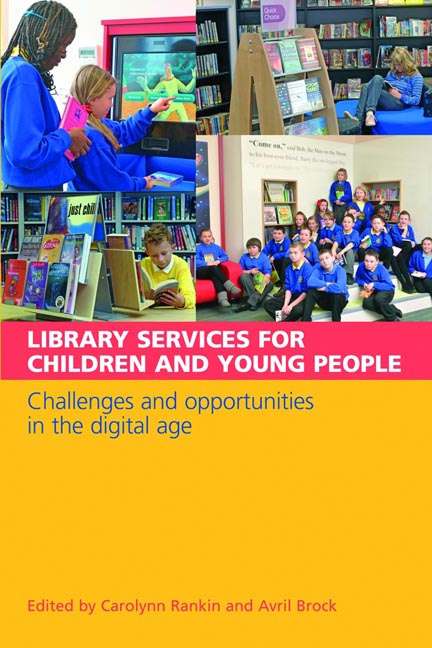Book contents
- Frontmatter
- Dedication
- Contents
- Contributors
- Foreword
- Acknowledgements
- Introduction and vision for the book
- Part 1 Children's library services – policy, people and partnerships
- 1 Library services for children and young people – an overview of current provision, future trends and challenges
- 2 21st-century school libraries – visionary spaces for learning
- 3 The changing shape of reading – the 21st-century challenge
- 4 Case study. Engaging and influencing policy and the curriculum – the Scottish Information Literacy Project experience
- Part 2 Connecting and engaging – reaching your audience and catching the latest wave
- Part 3 Buildings, design and spaces – libraries for children and young people
- Part 4 Issues for professional practice
- Index
1 - Library services for children and young people – an overview of current provision, future trends and challenges
from Part 1 - Children's library services – policy, people and partnerships
Published online by Cambridge University Press: 08 June 2018
- Frontmatter
- Dedication
- Contents
- Contributors
- Foreword
- Acknowledgements
- Introduction and vision for the book
- Part 1 Children's library services – policy, people and partnerships
- 1 Library services for children and young people – an overview of current provision, future trends and challenges
- 2 21st-century school libraries – visionary spaces for learning
- 3 The changing shape of reading – the 21st-century challenge
- 4 Case study. Engaging and influencing policy and the curriculum – the Scottish Information Literacy Project experience
- Part 2 Connecting and engaging – reaching your audience and catching the latest wave
- Part 3 Buildings, design and spaces – libraries for children and young people
- Part 4 Issues for professional practice
- Index
Summary
Introduction
This introductory chapter sets the scene, by exploring how library services for children and young people endeavour to meet the changing needs of their communities in the 21st century. It will consider the UK policies that have shaped current provisions and reflect upon the cultural and economic influences that inform the future direction for these services. Policy-makers are concerned about educational attainment and future employment prospects, therefore literacy levels and reading skills for the youth of the information age are receiving a high profile. The primary focus for the discussion is the UK, but as the public library is an international phenomenon, the discussion also extends to include librarians across the world, who are working to provide appropriate services for their communities. This chapter discusses the work of librarians who specialize in providing services and resources to support the needs of children and young people, from five to 18 years. These practitioners will usually be employed in the public library service or in school libraries. They may have a variety of different career titles, for example, children's librarian, school librarian, community librarian, teen or youth librarian, outreach librarian or literacy development officer. In this introductory chapter, the term ‘librarian’ includes all practitioners who are active intermediaries in providing library services for children, young people and their families. Perspectives from library practitioners are included, as they are actively involved in planning and delivering services and resources. Viewpoints from children and young people are also included, as their needs and desires should be recognized by adults. In sum, this chapter provides authentic, rich evidence about the benefits of partnership.
Library practitioners are at the forefront of promoting children's rights. They play a key role in disseminating information about the importance of literacy and reading to children, for parents, educators, children's advocates and political decision-makers. Libraries and librarians are vital aides to literacy development, and the generally held message is that reading with children is important, irrespective of first language, heritage or cultural background (Rankin and Brock, 2009). Koren (2011, 154) reminds us that the United Nations Convention on the Rights of the Child (CRC) offers support to develop library policy and practice, related to children and young people.
- Type
- Chapter
- Information
- Library Services for Children and Young PeopleChallenges and opportunities in the digital age, pp. 3 - 28Publisher: FacetPrint publication year: 2012
- 4
- Cited by



